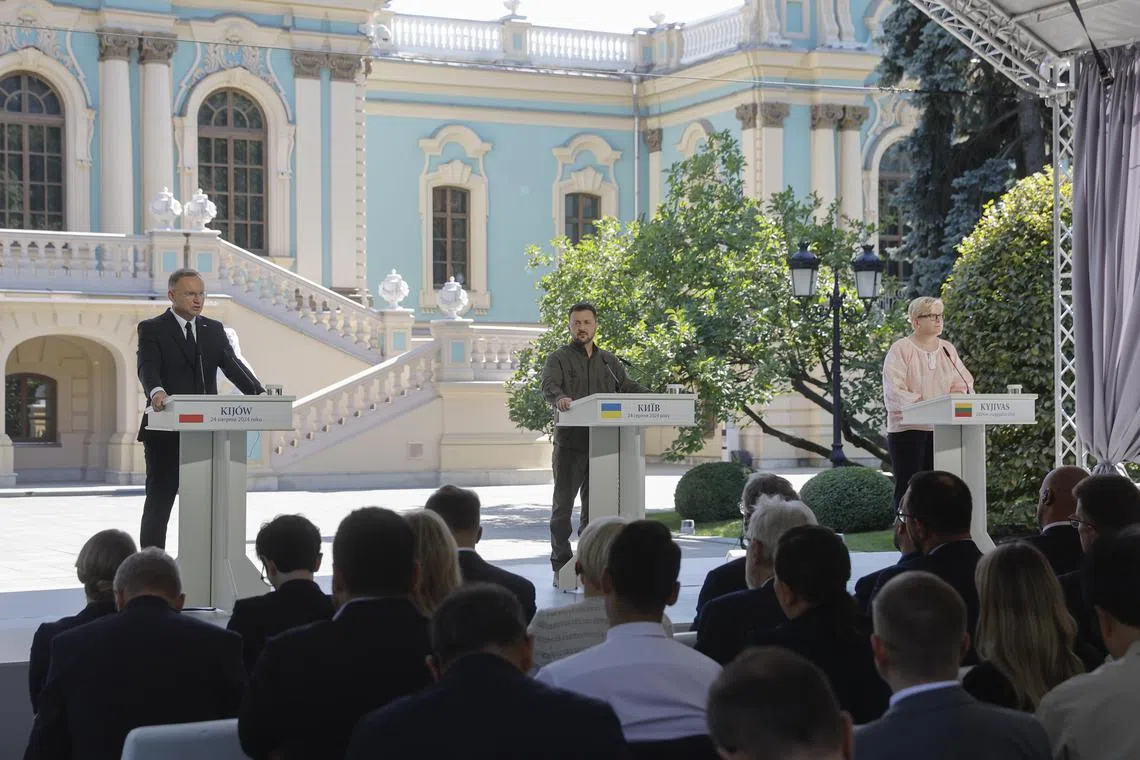Ukraine’s Zelensky touts new ‘drone missile’, calls Russia’s Putin ‘sick old man’
Sign up now: Get ST's newsletters delivered to your inbox

Ukrainian President Volodymyr Zelensky (centre) at a press conference in Kyiv on Aug 24, with Polish President Andrzej Duda (left) and Lithuanian Prime Minister Ingrida Simonyte.
PHOTO: EPA-EFE
KYIV – President Volodymyr Zelensky touted a newly developed Ukrainian “drone missile” on Aug 24 that he said would take the war back to Russia, and scornfully derided Russian President Vladimir Putin as a “sick old man from Red Square”.
As Ukraine marked 33 years of post-Soviet independence, Mr Zelensky said the new weapon – Palianytsia – was faster and more powerful than the domestically made drones that Kyiv has so far used to fight back against Russia, striking its oil refineries and military airfields.
“Our enemy will... know what the Ukrainian way for retaliation is. Worthy, symmetrical, long-ranged,” he said.
Mr Zelensky said the new class of weapon had been used for a successful strike on a target in Russia, but did not say where.
He used derisive language to describe Russia’s 71-year-old President and the nuclear rhetoric coming out of Moscow.
“A sick old man from Red Square who constantly threatens everyone with the red button will not dictate any of his red lines to us,” Mr Zelensky said, in a video on the Telegram messaging app.
Russia, which has attacked Ukraine with thousands of missiles and drones since it invaded in February 2022, has decried Ukrainian drone attacks as terrorism. Moscow’s troops are slowly advancing in Ukraine’s east and occupy 18 per cent of the country.
Mr Zelensky has been pressing Kyiv’s allies to allow him to use Western weapons deeper in Russian territory, such as to strike airbases used by Russian warplanes that pound Ukraine with missiles and glide bombs.
“I want to stress once more that our new weapon decisions, including Palianytsia, is our realistic way to act while some of our partners are unfortunately delaying decisions,” Mr Zelensky told a news conference.
Ukrainians say the word “Palianytsia” – a type of Ukrainian bread – is too difficult to pronounce for Russians and has been used, sometimes humorously, during the war as a way to tell Ukrainians and Russians apart.
“It will be very difficult for Russia, difficult to even pronounce what exactly has hit it,” Mr Zelensky said of the drone missile.
Top commander promoted
Mr Zelensky also promoted his top commander,
Cast by Moscow as an escalation and major provocation, Ukraine’s incursion has captured more than 90 settlements in the Kursk region, according to Kyiv, in the biggest invasion of Russia since World War II.
Speaking at a joint news conference with the leaders of Poland and Lithuania, Mr Zelensky told reporters the operation had in part been a preventive move to stop Russian plans to capture the northern city of Sumy.
Apart from capturing prisoners of war and creating a “buffer zone”, Mr Zelensky said the operation had other objectives that he could not disclose publicly.
Independence Day has surged in importance for Ukrainians during the invasion, which has spurred widespread patriotic sentiment.
In 2024, the public holiday took place after the US and German embassies issued warnings of a heightened risk of Russian missile and drone attacks across Ukraine. There had been no major strikes as at 6pm local time (11pm Singapore time) on Aug 24, but the air raid siren sounded in Kyiv in the late afternoon.
To mark the date, Mr Zelensky ratified the Rome Statute,
He also signed legislation banning the activities of religious groups linked to Russia,
Ukraine and Russia also said they had each secured the release of 115 prisoners of war
The Russian Defence Ministry said its freed servicemen had been captured during Ukraine’s attack in the Kursk region. REUTERS


